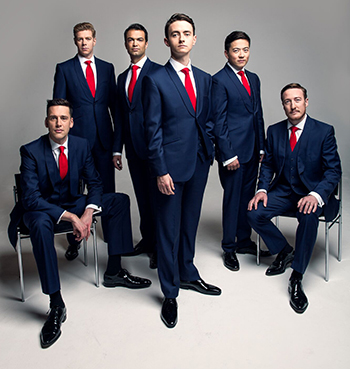
The King’s Singers regularly tour in Europe, North and
South America, Asia and Australasia. The group will be
performing in Bloemfontein on 14 February 2017.
Photo: Andy Staples
The King’s Singers, the acclaimed British a cappella vocal ensemble, are coming to Bloemfontein, hosted by the Odeion School of Music at the University of the Free State, for an unmissable performance.
Concertgoers from Bloemfontein and surrounding areas have the opportunity to experience this extraordinary vocal ensemble at the Dutch Reformed Church Universitas at a concert sponsored by the Arts Trust.
Named after King’s College in Cambridge, the group was formed in 1965, and for the past 48 years, their work, synonymous with the very best in vocal ensemble performance, appeals to a vast international audience.
The ensemble has performed for hundreds of thousands of people each season, and regularly tours Europe, North and South America, Asia and Australasia. Instantly recognisable for their immaculate intonation, vocal blend, diction and incisive timing, the King’s Singers are consummate entertainers.
The group’s repertoire has evolved to become one of the most diverse and compelling imaginable. They have commissioned more than 200 works, including landmark pieces from leading contemporary composers including Luciano Berio, György Ligeti, Sir James MacMillan, Krzysztof Penderecki, Toru Takemitsu, Sir John Tavener, Gabriela Lena Frank and Eric Whitacre. They have also commissioned arrangements of everything from jazz standards to pop chart hits, explored medieval motets and Renaissance madrigals, and encouraged young composers to write new scores.
In addition to performing to capacity audiences and creating highly regarded and much-loved recordings, the King’s Singers share their artistry at numerous workshops and masterclasses around the world.
Double Grammy award-winning artists, the group were honoured in 2009 for their Signum Classics release, Simple Gifts, and again in 2012 for their contribution to Eric Whitacre’s Light and Gold album. Recently voted into Gramophone Hall of Fame, rave reviews and repeated sell-out concerts confirm that the King’s Singers are one of the world’s finest vocal ensembles.
Watch videos of the The King’s Singers:
The King's Singers - Overture The Barber Of Seville
2016 Pioneer Day Concert with The King's Singers - Primary Medley
A Christmas Songbook by The King's Singers
Date: 14 February 2017
Time: 19:30
Place: Dutch Reformed Church Universitas, Bloemfontein
Cost: R295 per person | R268 per person for group bookings of 10+
Tickets for the concert are available at Computicket outlets (Checkers, Shoprite shops), at the door, or online.
For inquiries or more information, contact Ninette Pretorius at +27 51 401 2504.